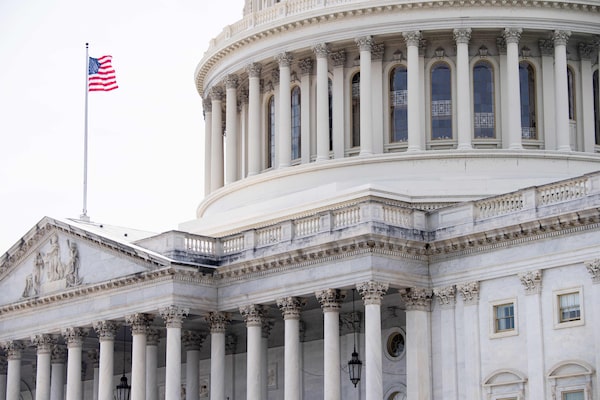
Congress may be closely divided, but that doesn’t mean the views of the two parties are close. Indeed, the opposite is true.SAUL LOEB/AFP/Getty Images
It is a matter of conviction inside Joe Biden’s White House that the spate of voting restrictions being passed by Republican state legislatures represents what he described Tuesday evening as “the most significant test of our democracy since the Civil War.” It is a matter of conviction among Republicans that the “voter fraud” their lawmakers are trying to stanch is itself a grave threat to democracy.
Put aside whether that formulation represents some kind of false equivalence, though both sides believe it does – even as both sides devoutly believe in the virtue of their desires and the evil in their rivals’ motives. But the very division on this vital question is a proxy for the broader divisions in American political life – and it is into that yawning gap that Mr. Biden stepped Tuesday while a handful of lawmakers struggle to craft an infrastructure bill that can garner sufficient support from both parties.
Congress may be closely divided – the Senate so much so that the 50-50 party breakdown passes special power to Vice-President Kamala Harris by virtue of her constitutional power to break a tie – but that doesn’t mean the views of the two parties are close. Indeed, the opposite is true.
The result is that both parties are trying to change the rules.
The Democrats are attempting to alter the rules in the Capitol by trying to eliminate the filibuster, and the Republicans are doing the same in state capitols with their determined efforts to make it harder to vote.
“The parties share the notion that the rules of the game seem to stand in the way of accomplishing their goals,” said Sarah Binder, a George Washington University political scientist. “The Republicans are a minority party looking for ways to entrench their advantages and to salvage the power they have. The Democrats are trying to convert their popular majorities into control of governing institutions.”
This came into sharp relief in recent days as Democratic lawmakers fled Texas rather than allow their presence in Austin, the state capital, to provide the quorum required to pass voter-restriction legislation. In his remarks Tuesday, Mr. Biden called Republican efforts to cast doubts on his election “dark” and “sinister”; in a speech delivered, poignantly, in the National Constitution Center in Philadelphia, the city where the document was written in 1787, he said: “In America, if you lose, you accept the results. You follow the Constitution, you try again. You don’t call facts ‘fake’ and then try to bring down the American experiment just because you’re unhappy. That’s not statesmanship. That’s selfishness.”
Not since the late 1960s have the two parties moved at roughly the same time to produce dramatic alterations to the way U.S. politics operate. In that instance, Democrats reduced the filibuster barrier from two-thirds (67 votes) to three-fifths of the chamber and passed legislation to eliminate the poll tax and extend the franchise to 18-year-olds, even as Republican president Richard Nixon moved to impound, or not spend, funds appropriated by Congress, which the House budget committee described as his “repeated attacks on our nation’s separation of powers.”
Now, a half-century later, Mr. Biden is chary of wading into the fight over the filibuster, the Senate rule that requires a three-fifths vote, or 60 members, to proceed with consideration of most measures. He sat in that chamber for 36 years and is aware of how jealous senators are of their prerogatives and how resentful they are when a president 16 blocks away tries to intrude in their internal workings. Even Lyndon Johnson, a magus of legislative politics during his dozen years in the Senate – the last four (1957-1961) as an unusually powerful Senate majority leader – eventually ran afoul of that impulse.
Right now, 48 Democrats seem willing to remove the filibuster, which would allow them to push through, among other measures, major environmental and economic bills. Two of their members, Joe Manchin of West Virginia and Kyrsten Sinema of Arizona, are balking – and so far have resisted all entreaties to change their views, which they have expressed in separate newspaper columns.
At the state level, as many as two dozen voter-restriction bills have passed legislatures in 14 states. The struggle in Texas has been so dramatic and contentious that Governor Greg Abbott, a Republican, has threatened that the Democrats who exiled themselves rather than permit the legislation to proceed “will be arrested” if they return to the state.
Meanwhile, efforts continue to find a compromise on a multibillion-dollar infrastructure bill – and it has fallen to Republican Senator Rob Portman of Ohio, who has announced his retirement, to help fashion the legislation. “It’s very important for the country,” Mr. Portman said in an interview. “We have outdated infrastructure, and by improving it we can be more competitive and productive. But it also is important to show we can do something big, something important, on a bipartisan basis.”
Our Morning Update and Evening Update newsletters are written by Globe editors, giving you a concise summary of the day’s most important headlines. Sign up today.